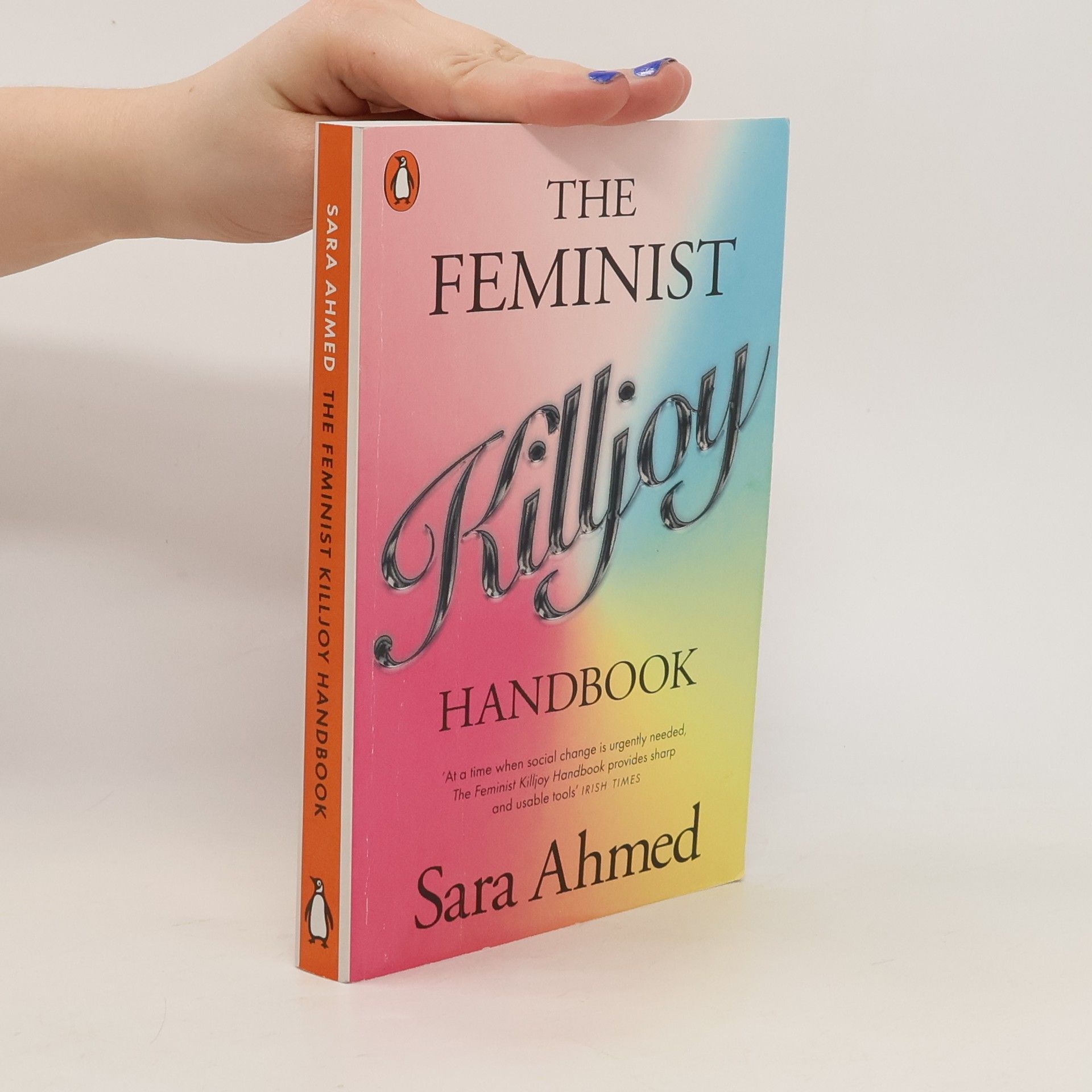'Not only a dazzling analysis of the workings of sexism, but a balm for the soul. It will teach you how to survive and how to transform the world' Hannah DawsonWe have to keep saying it because they keep doing it.Do colleagues roll their eyes in a meeting when you use words like sexism or racism? Do you refuse to laugh at jokes that aren't fun[Bokinfo].
Sara Ahmed Book order (chronological)
Sara Ahmed is a feminist writer, scholar, and activist whose research explores how bodies and worlds take shape. She investigates the dynamics of power, examining how it is secured and challenged within everyday life and institutional cultures. Ahmed delves into the intersection of our experiences of the world and our identities with prevailing power structures. Her work prompts readers to consider how we can actively challenge and transform unjust systems.






Feminist Killjoy
Das Handbuch für die feministische Spaßverderber:in
Bekannt für ihre messerscharfen Analysen und provokativen Thesen wählt die britische Autorin, Wissenschaftlerin und Aktivistin Sara Ahmed in diesem „Handbuch für die feministische Spaßverderberin“ eine eher persönliche, essayistische Herangehensweise, um ihre intellektuell anspruchsvollen Theorien im Alltag leb- und anknüpfbar zu machen. Praxisnah, frech und auch wütend geschrieben enthält ihr hochaktuelles Buch zahlreiche kluge Ideen zur Umsetzung eines intersektionalen Feminismus auf verschiedensten Ebenen, erhellende Beispiele für ihre praktische Anwendung, Leitsätze und Überlebenstipps, Lektüreempfehlungen und Anleitungen für Lesegruppen. Sara Ahmed, die hier auf eigene Erfahrungen zurückgreift und auf die anderer, vor allem queerer BIPoC-Vordenkerinnen, ist ein unterhaltsames, praxisnahes Buch der Selbstermächtigung gelungen, das jenen, die nicht wissen, wie mit dem Feminismus zu beginnen ist, ebenso dienlich sein kann wie jenen, die schon mittendrin stecken, die weiterlernen und die Geschichtsschreibung des feministischen Widerstands als Quelle der Stärke und der Inspiration nutzen wollen.
Eigenwillige Subjekte
Eigenwilligkeit als Politik des Ungehorsams
In ›Eigenwillige Subjekte‹ analysiert die feministische Kulturwissenschaftlerin Sara Ahmed das Motiv der ›Eigenwilligkeit‹ und arbeitet dessen Ambivalenz von Dissens, Anklage und Widerständigkeit, Fremdzuschreibung und Emanzipation heraus.Ahmed untersucht die Beziehung zwischen dem Willen und der Eigenwilligkeit, zwischen ›schlechtem‹ und ›gutem‹ Willen sowie zwischen dem Willen der Einzelnen und dem Gemeinwillen, indem sie tief in philosophische und literarische Texte eintaucht und diese untersucht. Ihre Überlegungen geben Aufschluss darüber, inwiefern der Wille in eine politische und kulturelle Landschaft eingebettet ist, wie er verkörpert wird und wie Wille und Eigenwilligkeit gesellschaftlich vermittelt werden. Mit ihrem Fokus auf Eigensinnige, Umherirrende und Abweichler*innen weist Ahmed auf das widerständige Potenzial hin, das der Eigenwilligkeit inhärent ist.Gestützt auf Ansätze feministischer, queerer und antirassistischer Politiken bestärkt sie in ihrer einzigartigen Analyse des eigenwilligen Subjekts die Figur, die auf falsche Weise ihren gesellschaftlichen Platz fordert oder einfach nur zu viel will, darin, dass Eigenwilligkeit erforderlich ist, um Dissens zu artikulieren und widerständig handeln zu können. In diesem Sinne ist die ›feministische Spaßverderber*in‹ eine enge Verwandte des ›eigenwilligen Subjekts‹.
Drawing on oral and written testimonies from academics and students who have made complaints about harassment, bullying, and unequal working conditions at universities, Sara Ahmed examines what we can learn about power from those who complain about abuses of power.
Continuing the work she began in The Promise of Happiness and Willful Subjects by taking up a single word and following its historical, intellectual, and political significance, Sara Ahmed explores how use operates as an organizing concept, technology of control, and tool for diversity work.
Showing how feminist theory is generated from everyday life and the ordinary experiences of being a feminist, Sara Ahmed highlights the ties between feminist theory and living a life that sustains it by building on legacies of feminist of color scholarship and discussing the figure of the feminist killjoy.
Willful Subjects
- 320 pages
- 12 hours of reading
Cultural theorist Sara Ahmed explores how willfulness is often a charge made by some against others. By following the figure of the willful subject, who wills wrongly or wills too much, Ahmed suggests that willfulness might be required to recover from attempts at its elimination.
Emotions work to define who we are as well as shape what we do and this is no more powerfully at play than in the world of politics. The author considers how emotions keep us invested in relationships of power, and also shows how this use of emotion could be crucial to feminist and queer political movements.
Ahmed argues that a commitment to diversity is frequently substituted for a commitment to actual change. She traces the work that diversity does, examining how the term is used and the way it serves to make questions about racism seem impertinent. Her study is based in universities and her research is primarily in the UK and Australia, but the argument is equally valid in North America and beyond.

